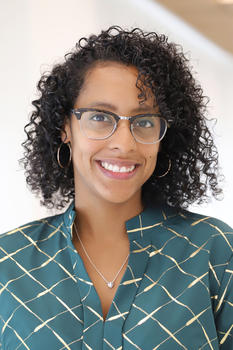In This Story
Assistant Professor of Social Work Melissa Villodas shares her research on the impact neighborhood environments have on mental health

Assistant Professor in the Department of Social Work Melissa Villodas is ardent about fostering connectedness within communities. Her research has included investigating depression among black youth living in public housing and how they experience connection with their neighborhood. Villodas has studied the effects of one’s structural environment and perceived environment in relation to mental health. She is also motivated by her time spent as a clinician at a foster care agency in New York City. Villodas is trained in intervention research, a methodology that seeks to learn what treatments and strategies produce the best outcomes. She hopes her work on neighborhood cohesion will help address systematic gaps social work service and delivery.
“In my work, I have found that connectedness, or how we feel connected or interrelated with our peers, community, and schools, really buffers against mental health challenges that may be associated with the neighborhood environment,” said Villodas. “If you have a very disordered neighborhood, but you feel connected to these key social systems that can greatly help your mental health.”
She uses her research to uplift disadvantaged populations.
“I want to influence policies to create safe places to live for marginalized communities that improve neighborhood environments without resulting in displacement or gentrification,” said Villodas.
Villodas recently presented at the Council on Social Work Education. With doctoral students at the University of North Carolina, Chapel Hill, she presented a paper entitled “Unequal Beginnings” that details the experiences of PhD students in social work who are racial minorities with intersecting identities. The presentation explored the experiences of first-generation students. The purpose of the presentation was to guide social work educators on how they can improve their programs for first-generation students.
As a first-generation Afro-Latina who has earned her PhD, Villodas understands what it is like to feel out of place while pursuing an advanced degree.
“I’ve walked into rooms where I felt like everyone else knew what was going on and I was the only one lost,” said Villodas, PhD, LMSW, LCSW-A. “The truth is that even if you don’t realize it, people with different identities are needed to bring diversity and representation into educational spaces.”
The ambition to advance social work practice follows her into her role as an educator here at Mason.
Last semester, Villodas taught Foundations for Direct Practice, an introduction to social work course where students learn the values, skills, and theories important for all new social work students to understand. This semester, she will be teaching Community Practice Over the Life Course, which focuses on how environmental factors impact social work, such as how poverty and oppression influence clients. She is always excited to impart her knowledge and experiences to her students.
“As a social worker, it is important to have what I like to call critical consciousness. We need to be attuned with our own thoughts, emotions, and histories,” Villodas said. “I want my students to leave my course with the confidence and competence to go out and be conscious social workers who center clients in direct practice.”
Villodas’s appreciation for cultural connectedness is not limited to her research pursuit and is a staple her personal life. She has been training in Afro-Latin dances for seven years and experiences the benefits of engaging with one’s community.
“I believe engaging culture improves mental health,” said Villodas. “By realizing that you belong to or engage with a rich history of resilience and expression can be very empowering.”
Villodas will be presenting her dissertation paper “Testing the Stress Process Model: The Influence of Perceived Neighborhood Environment and Connectedness on Mental Health Symptoms of Justice-Involved Black Youth Society” at the Society for Social Work Research (SSWR) conference in January.
